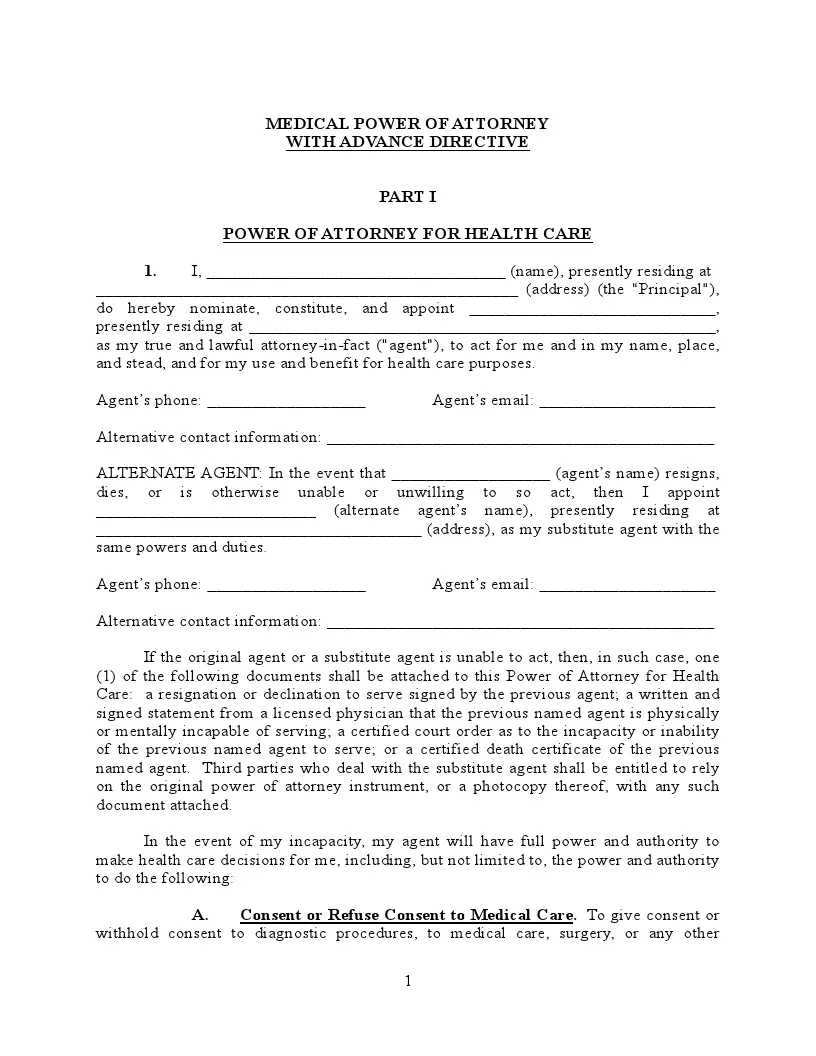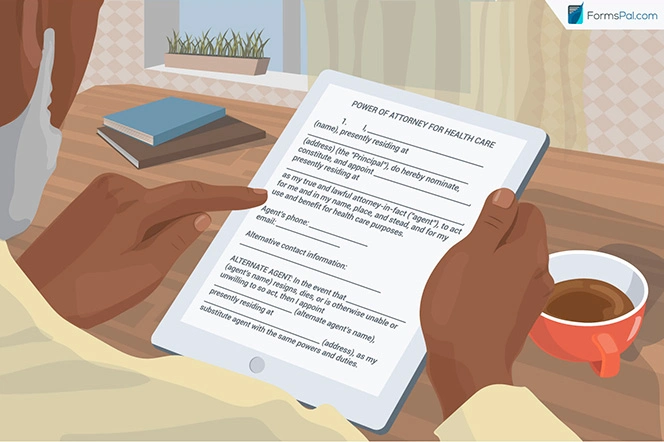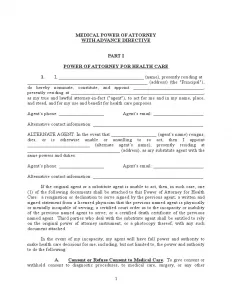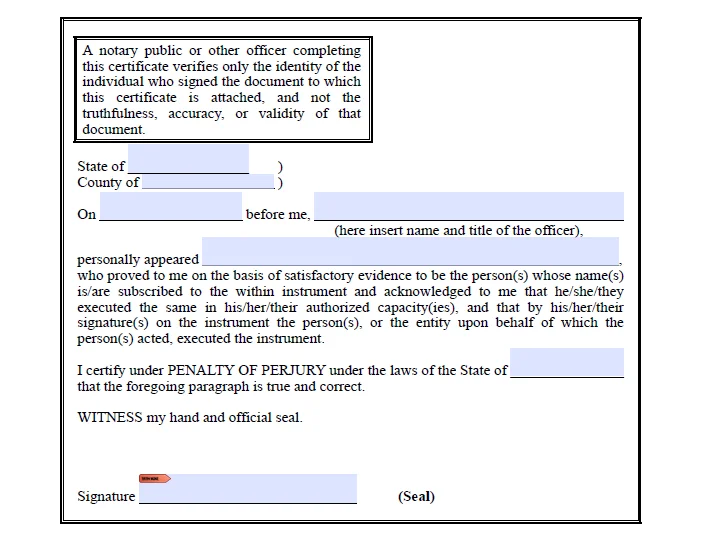Medical Power of Attorney Form (HCPOA)
A medical power of attorney is a crucial form for most adults, especially if you don’t have a spouse or close family member who can make medical decisions on your behalf. While filling out a form isn’t anyone’s favorite task, having one on hand can be a huge relief.
Plus, should you ever need an attorney-in-fact with medical power of attorney, you’ll be grateful that you already have the forms on file.
Taking these simple precautions can make an emergency much easier to handle and can give you more confidence as you move forward with any medical procedures.
This guide will talk about what a medical power of attorney form does, what powers you can grant your attorney-in-fact or agent, and any other questions you have regarding a power of attorney form. We’ll even go over how to fill out your medical power of attorney form.

Build Your Document
Answer a few simple questions to make your document in minutes
Save and Print
Save progress and finish on any device, download and print anytime
Sign and Use
Your valid, lawyer-approved document is ready
What is a Medical Power of Attorney?
A medical power of attorney (MPOA, Health Care POA, or HCPA) is a legal document that lets you pick a specific person you would like to appoint to make difficult medical decisions on your behalf when you are unable to make them yourself.
They can make a wide variety of decisions for you and are typically the first person your doctors will contact if they need someone to make a decision regarding your care and you are not available.
You use an MPOA to designate your agent or attorney-in-fact, sometimes also called “proxy,” “surrogate,” or simply “representative.”
Your medical agent does not need to be a family member, but they should be someone who knows you well and understands your health care preferences.
Knowing what kinds of medical care you would like to receive is especially important since your representative may be asked to make critical decisions including your end-of-life care.
It’s important to get a durable power of attorney for health care decisions since other kinds of power of attorney expire when you become incapacitated. A medical power of attorney is even more important if you cannot communicate, so it’s doubly important to make it durable.
Here are some of the medical powers of attorney these forms can grant:
Consenting to or Refusing Medical Care
Your health care agent can decide whether or not to proceed with any care your doctors recommend if you cannot make the decision yourself. If you have an MPOA, your health care proxy can make decisions even before your family members unless they also have power of attorney.
Employment of Health Care Personnel
Your health care proxy can also choose between different medical professionals to provide your care.
Access Medical Records
Your agent can be given access to your medical records so that they can make the best possible health care decisions on your behalf.
Accept or Refuse Life-Prolonging Procedures
Your agent is also granted the right to make decisions about life-prolonging procedures. They can refuse tube feeding or a respirator if they think that you would not have the quality of life you would prefer after receiving those procedures.
Of course, your attorney-in-fact can also choose to pursue those procedures, so it’s important to have frank conversations about your preference.
Provide Relief from Pain
Your healthcare agent can also make decisions about what kinds of pain control you’re given and what types of medications you’ll take.
This isn’t the same as prescribing those medications. Instead, if your doctor offers morphine or another potentially sedative drug, your agent will decide whether or not to accept the morphine or ask for something else.
Arrange for the Care of Your Remains and Decide Whether to Donate Organs:
In the event that the primary passes, their attorney-in-fact is also responsible for making arrangements for their body. That can include scheduling burial or arranging for cremation. They may also be asked to decide whether or not to allow organ donation even if you have already signed up as an organ donor.
These aren’t all of the powers that your Medical Power of Attorney can grant, but they are some of the most important. Of course, you can also customize the form so that you are only granting some of the powers.
Just remember that the fewer powers you grant, the trickier a medical emergency could become.
One alternative to denying powers is to write a living will and medical advance directive. Your agent is required to obey those documents and see them executed to the best of their ability, or step aside and allow someone else to do so.
This way, you can have a little more control in picking the person who will be making decisions on your behalf.
Disambiguation
Since there are several different documents that are all relatively similar, we thought it was important to address some of the differences between them so that you know which one you need and when.
Medical POA vs. Living Will
Both of these documents are advance directives, but they are a little different in how they work.
A living will lets you make decisions about your end-of-life care, like whether you would want life support on machines, want to refuse blood transfusions, or want to refuse pain medications that could make it difficult for you to think and stay awake.
A medical power of attorney just designates someone with health care authority to make those decisions for you.
You have a little more control with a living will, but they won’t cover any situations you don’t anticipate in the will. A medical power of attorney relies on your agent understanding your wishes and acting on them, but they can respond to a wider range of circumstances on your behalf.
Of course, some states allow these two forms to be combined.
Always check your state law to see if you live somewhere where both forms can be filled out together and what the signing requirements are.
Medical POA vs. Health Care Proxy
Both of these documents designate someone who can make health care decisions for you. However, your Medical POA is also empowered to pay for your medical care (from your resources) while your health care proxy can only make decisions about your care.
It is possible that your attorney-in-fact and proxy will disagree about your care, and often these disagreements end up in court and become a financial burden.
To help avoid that, if you do designate both a health care attorney and a health care proxy, make sure they both know what your preferences would be and how you prioritize the kind of care you want versus the cost of that care.
When to Use a Medical Power of Attorney
A medical power of attorney is something that you should ideally set up long before you need it. You never know when you might need an agent. It might be some complications after surgery, a car accident, or a long-term health crisis. You can create an MPOA any time you choose to after you are legally an adult.
You are required to be of sound mind when you fill out the form, so you cannot be taking any medications that impair your thinking and cannot be suffering from any active condition that might make it more difficult to think.
A medical power of attorney kicks in anytime you are unable to communicate for yourself. Durable medical powers of attorney are important in case you are incapacitated. They can help make decisions if you are in an unexpected medical crisis, though it’s more common to have an MPOA to help with chronic conditions and end-of-life illnesses.
Medical Power of Attorney Signing Requirements by State
| STATES | Signing requirements | STATE LAW |
| Alabama | Two Witnesses | Alabama Code, Section 22-8A-4 |
| Alaska | Notary Public OR Two Witnesses | Alaska Statutes, Section 13.52.010 |
| Arizona | Notary Public OR One Witness | Arizona Revised Statutes, Section 36-3221 |
| Arkansas | Notary Public OR Two Witnesses | Arkansas Annotated Code, Section 20-6-103 |
| California | Notary Public OR Two Witnesses | California Probate Code, Section 4701 |
| Colorado | Notary Public recommended | Colorado Revised Statutes, Section 15-14-506 |
| Connecticut | Two Witnesses | Connecticut Revised Statutes, Chapter 368w, Section 19a-575 |
| Delaware | Two Witnesses | Delaware Code, Title 16, Section 2503 |
| Florida | Two Witnesses | Florida Statutes, Section 765.202 |
| Georgia | Two Witnesses | Georgia Code, Section 31-32-5 |
| Hawaii | Notary Public AND Two Witnesses | Hawaii Revised Statutes, Section 327E-3 |
| Idaho | Notary Public recommended | Idaho Statutes, Section 39-4510 |
| Illinois | One Witness | Illinois Compiled Statutes, Chapter 755, Section 45/4-5.1 |
| Indiana | One Witness | Indiana Code, Section 16-36-1-7 |
| Iowa | Notary Public OR Two Witnesses | Iowa Code, Section 144B.3 |
| Kansas | Notary Public AND Two Witnesses | Kansas Statute, Section 58-632 |
| Kentucky | Notary Public OR Two Witnesses | Kentucky Revised Statutes, Section 311.625 |
| Louisiana | Two Witnesses | Louisiana Revised Statutes, Section 28:224 |
| Maine | Two Witnesses | Maine Probate Code, Title 18-C, Section 5-803 |
| Maryland | Two Witnesses | Maryland Annotated Code, Section 5–603 |
| Massachusetts | Two Witnesses | Massachusetts General Laws, Chapter 201D, Section 2 |
| Michigan | Two Witnesses | Michigan Compiled Laws, Section 700.5506 |
| Minnesota | Notary Public OR Two Witnesses | Minnesota Statutes, Section 145C.03 |
| Mississippi | Notary Public OR Two Witnesses | Mississippi Annotated Code, Section 41-41-205 |
| Missouri | Notary Public | Missouri Revised Statutes, Section 404.705 |
| Montana | Two Witnesses | Montana Annotated Code, Section 50-9-103 |
| Nebraska | Notary Public OR Two Witnesses | Nebraska Revised Statutes, Section 30-3404 |
| Nevada | Notary Public OR Two Witnesses | Nevada Revised Statutes, Section 162A.790 |
| New Hampshire | Notary Public OR Two Witnesses | New Hampshire Revised Statutes, Section 137-J:14 |
| New Jersey | Notary Public OR Two Witnesses | New Jersey Statutes, Section 26:2H-56 |
| New Mexico | Two Witnesses | New Mexico Annotated Statutes, Section 24-7A-4 |
| New York | Two Witnesses | New York Consolidated Laws, Section 2981 |
| North Carolina | Notary Public AND Two Witnesses | North Carolina General Statutes, Section 32A-16 |
| North Dakota | Notary Public OR Two Witnesses | North Dakota Century Code, Section 23-06.5-05 |
| Ohio | Notary Public OR Two Witnesses | Ohio Revised Code, Section 1337.12 |
| Oklahoma | Two Witnesses | Oklahoma Statutes, Section 63-3101.4 |
| Oregon | Notary Public OR Two Witnesses | Oregon Revised Statutes, Section 127.515 |
| Pennsylvania | Two Witnesses | Pennsylvania Consolidated Statutes, Title 20, Section 5452 |
| Rhode Island | Notary Public OR Two Witnesses | Rhode Island General Laws, Section 23-4.10-2 |
| South Carolina | Notary Public AND Two Witnesses | South Carolina Code of Laws, Section 62-5-517 |
| South Dakota | Notary Public OR Two Witnesses | South Dakota Codified Laws, Section 34-12D-2 |
| Tennessee | Notary Public OR Two Witnesses | Tennessee Code Annotated, Section 34-6-203 |
| Texas | Two Witnesses | Texas Statutes, Health and Safety Code, Section 166.154 |
| Utah | One Witness | Utah Code, Section 75-2a-107 |
| Vermont | Two Witnesses | Vermont Statutes, Title 18, Section 9703 |
| Virginia | Two Witnesses | Virginia Code, Section 54.1-2983 |
| Washington | Notary Public OR Two Witnesses | Washington Revised Code, Section 11.125.050 |
| West Virginia | Notary Public AND Two Witnesses | West Virginia Code, Section 16-30-4 |
| Wisconsin | Two Witnesses | Wisconsin Statutes and Annotations, Section 155.10 |
| Wyoming | Notary Public OR Two Witnesses | Wyoming Statutes, Section 35-22-403 |
Steps to Getting a Medical POA
If you want to get a medical POA set up, there are a few steps you have to follow. If you have a lawyer, you can consult with them and let them know that you would like to set up a medical power of attorney. Otherwise, you can use a medical POA form to create your directive.
Step 1: Select an Attorney-in-Fact

The first thing you need to do is decide who you want to trust with medical power of attorney.
This should be someone who understands your wishes, is willing to take on the responsibility, and who you trust to have access to your medical records and pay your medical bills from your resources.
Step 2: Determine Health Care Attorney Powers

Once you know who you would like to trust, you can also determine the exact set of powers you want to give them.
Step 3: Decide Whether You Also Want a Living Will

You can also use a living will to let health care providers know what you would like for end-of-life care.
Some states will allow you to use your MPOA form for your living will while other states will require you to attach it with your other health care directives.
Step 4: Fill Out Your Medical Power of Attorney Form

You’ll need to fill out the MPOA exactly or it may not be considered valid. As for signing requirements, two witnesses or a notary public acknowledgment is usually enough. However, it might be different in some states, so check your local laws in advance.
Step 5: Attach Any Additional Health Care Directives

If you have another health care directive you want to create, you should do that at the same time. You can add health care directives later, of course, but it’s better to do things all at once if you can.
If you add an additional health care directive later, you should reread your medical power of attorney to make sure that the two documents don’t contradict one another.

How to Fill Out a Medical Power of Attorney
Now that you know more about what a power of attorney for health care does, you need to know how to fill out the form.
Step 1: Fill Out Your Personal Information and Name Your Agent
Once you have an MPOA form, you will need to fill out your name and current address (state, county, street, and zip code) as well as the name, address, and contact information (phone number, email address, etc.) of anyone you would like to designate with medical power of attorney.
You should also update this section of your medical power of attorney form if you or your attorney-in-fact move.

Step 2: Name Alternate Agents if Desired
Your alternate (successor) agent is essentially your backup agent in case your primary attorney is also incapacitated or cannot be reached in time to make important decisions. They are also the first person who will take over if your primary agent declines to act.
You can name one person, several people, or not name an alternative agent at all. If you do not name an alternative agent and your primary health care attorney refuses to act, decision making falls to your closest relative.

Step 3: Approve or Disapprove the Provisions of Your Medical Power of Attorney Form
Our form has several powers already outlined for you. You can accept all of those powers, or you can edit the document to remove one or more.
In rare circumstances, you may also want to add additional medical powers, though it’s a good idea to consult with a lawyer if you want to modify anything.

Step 4: Add Any Necessary Modifications
If you did decide on any additional modifications, you need to make sure those are in place before signing or filing the document. The last thing you want is for an incomplete MPOA to interfere with your care.
Step 5: Leave the Revocation Clause Blank (Until Needed)
Most MPOA forms include a revocation clause in case something happens, and you if decide to change who gets your health care power of attorney, you will need to revoke your original power of attorney first.

For now, leave this section blank.
Step 6: Sign and Get the Final Document Notarized and Filed
Different states have different requirements when it comes to getting your power of attorney for health care form notarized. You should always check what the requirements are in your area.
Even if you aren’t required to get the form notarized, it’s a good idea to make sure that the document is seen as valid and respected.
If you have a lawyer, make sure that they have a copy of the form.
Your attorney-in-fact should also have a copy, and you should keep one as well. If you have a primary care provider, you may want to give them a copy as well along with your emergency contacts.

Other Documents Worth Attaching to Your MPOA
Your MPOA gives your agent a lot of power, but it doesn’t give them everything. Here are a few other documents you should consider attaching at the same time to make sure you’re covered for every eventuality.
- Health Care Advance Directive
- Financial POA
- Living Will
- Last Will and Testament
Frequently Asked Questions
What can happen if I don't have a Medical POA?
If you don’t have a medical POA, your closest living relative will make health care decisions for you.
If your relatives cannot be reached, and you do not have any health care directives or a living will, your doctors will use their best judgment to direct your care.
Does my spouse have a medical POA without the document?
In effect, yes. Your spouse has the right to make medical treatment choices for you by the nature of your relationship.
However, domestic partnerships and other relationships that have not been recognized by the State do not automatically have POA rights.
Do I have to notarize a medical PoA?
Not necessarily. Some states don’t require you to have your MPOA notarized or even seen by a notary public. Other states require that you see a notary public and have the signing properly witnessed.
Will my agent be responsible for covering medical expenses?
Your agent is responsible for paying your medical expenses, but they will not be expected to pay for your care with their resources.
Instead, they are authorized to pay for your medical treatment expenses from your resources and accounts.
